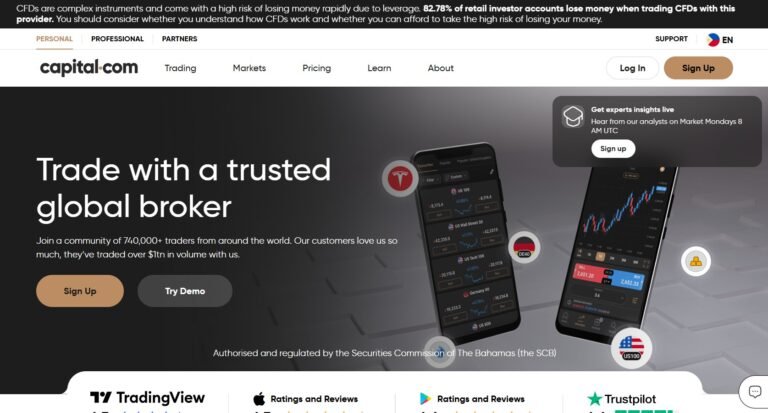Table of Contents
Introduction to Capital.com
This Capital.com review takes an in-depth look at the broker’s services, regulatory framework, and overall reliability. Capital.com claims to provide access to over 3,000 markets, including forex, stocks, indices, cryptocurrencies, and commodities, with operations registered in multiple jurisdictions, including the UK, Cyprus, and Australia.
But with so many mixed opinions online, traders want to know: is Capital.com a scam or a trustworthy platform? This article is designed for two types of readers — those who suspect they’ve been scammed by Capital.com and are looking for clarity, and those considering opening an account but want to verify its legitimacy first. This Capital.com scam review uncovers all the crucial warning signs you need to know.
Capital.com: Regulation & Legal Status
One of Capital.com’s strongest points is its regulatory status. The broker is licensed by reputable financial authorities such as the UK’s Financial Conduct Authority (FCA), Cyprus Securities and Exchange Commission (CySEC), and the Australian Securities and Investments Commission (ASIC). These licenses provide oversight, enforce compliance, and offer certain levels of client protection.
However, traders should remain cautious, as some unregulated brokers mislead users by referencing top-tier authorities without holding valid licenses. Always verify a broker’s credentials directly with the regulator. Learn how to spot a scam broker before it’s too late.
Given these verifiable licenses, it becomes less convincing to argue that Capital.com is a scam, though individual experiences may still vary.
Trading Conditions & Platform Analysis of Capital.com
Capital.com offers commission-free trading with tight spreads starting from 0.6 pips on major pairs. The minimum deposit requirement is relatively low at $20 (for cards and e-wallets), making it accessible for beginners. Leverage varies by region, capped at 1:30 for retail clients under FCA/ESMA rules and up to 1:500 for professional traders.
The broker provides a proprietary platform available on web and mobile, integrated with AI-driven tools, as well as MT4 access for those preferring a traditional setup. However, traders should note that having MT4 does not automatically guarantee a broker’s trustworthiness.
Transparency regarding liquidity providers and execution models could be clearer. Before committing funds, review what to check before signing up with a trading platform. Despite its features, Capital.com might be a fraud if any hidden policies negatively impact clients.
Reputation & User Reviews About Capital.com
On Trustpilot, Capital.com holds a strong rating, with users praising its intuitive platform and educational content. However, some negative reviews cite slow withdrawal processes and unresponsive customer service — issues worth considering before investing.
According to SimilarWeb, Capital.com attracts significant global traffic, indicating a large active user base. While this builds credibility, be cautious: online reviews can be manipulated or faked, so always cross-reference feedback from multiple independent sources.
How to Test Whether Capital.com Is a Scam
To evaluate Capital.com’s authenticity, here are practical steps:
1. Verify regulation: Check licenses with the FCA, ASIC, or CySEC directly through their official websites.
2. Investigate complaints: Search for credible reviews and warnings on forums like Forex Peace Army and independent review platforms.
3. Test functionality: Use Capital.com’s demo account to explore the platform without risking real money.
4. Review withdrawal terms: Ensure payout policies are clear and reasonable, avoiding brokers with crypto-only or restrictive withdrawal options.
5. Watch for false promises: Be wary of claims guaranteeing profits, as no legitimate broker offers risk-free trading.
If you suspect fraudulent activity, report it to the FTC’s fraud portal or your local regulator.
Final Verdict & Alternatives
Overall, Capital.com presents itself as a well-regulated broker with competitive trading conditions, making it unlikely to be an outright scam. However, traders should remain vigilant, as mixed user feedback suggests potential operational issues.
If you prefer extra security, consider brokers regulated by multiple top-tier authorities, such as IG or Saxo Bank, which offer transparent terms and established reputations. For U.S. clients, reviewing firms licensed by the SEC can provide added peace of mind.
Remember, only trade with regulated brokers to minimize risks and protect your capital.


